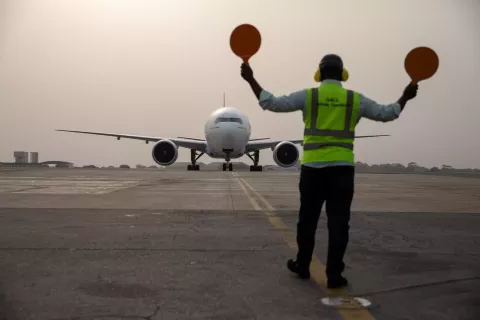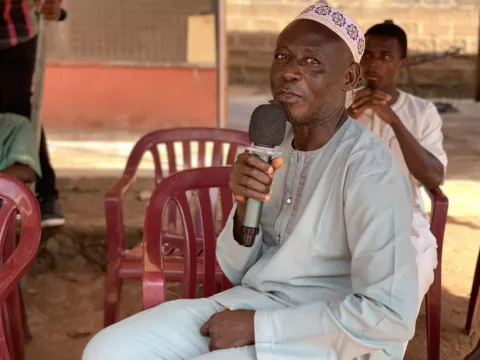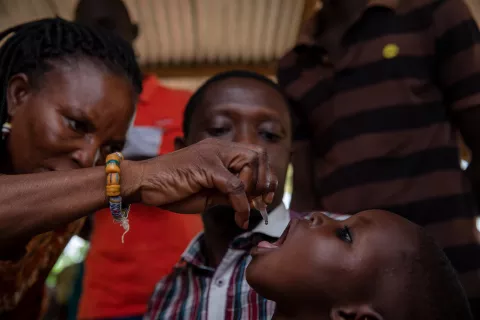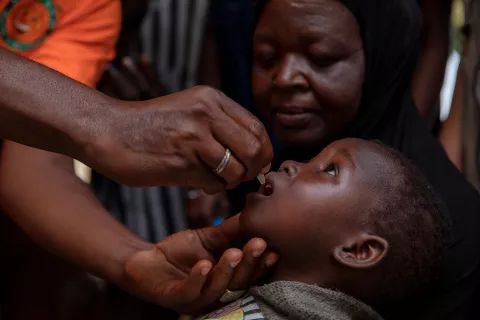“Using my voice for good” – Abena Donkor’s story
How social mobilization and community influencers determine the success of vaccination campaigns

BOLE, Savanna Region, 27 February 2022 – Abena Donkor, a mother of four and a farmer, lives in the remote community of Gbampe in the Bole District of the Savanna Region. She was getting ready for work when she heard an announcement on radio. “From the 26th of February to the 2nd of March, a team will come to your community to ensure everyone has received the yellow fever vaccine. All persons aged 9 months to 60 years are eligible to be vaccinated.” She took note of it and left for the farm.
As she returned home in the afternoon, the same announcement was blaring from the information center in the middle of her community. She had heard from conversations with friends and neighbors that there was a disease outbreak in some of the small towns and some people had died. She sighed and thought to herself, “I hope this disease does not come to this community.” Pushed by fear, she decided to be a volunteer. After cooking and serving dinner, she went from house to house, checking that her neighbors had heard the announcement.
She introduced herself to the Ghana Health Service team and they worked with her to mobilize the entire community. Some of the women volunteered to join her when they had the time.
In October 2021, an outbreak of Yellow Fever disease was detected by the Ghana health Service in the Savanna region of Ghana. There have been over 878 suspected cases with over 40 deaths, including children. Over 200 cases have tested positive. Following this the Ghana Health Service with support from UNICEF began a vaccination campaign. One of the major aspects where UNICEF has provided support in such campaigns, including this, is social mobilization.
In an infectious-disease outbreak, social mobilization involves engaging and empowering communities to be agents of change in tackling the spread of the virus and its effects amongst themselves. Usually, the start of a campaign requires a response that is often highly medicalized and centrally controlled; however, it cannot be successfully carried out without social mobilization.


Timely social mobilization is critical to successful containment of diseases. It can counter misinformation and unverified rumors that can damage a community’s willingness to change behaviors. Once a community’s trust is lost, it is hard to win back and can contribute to strong resistance and counterproductive behaviors.
It is essential in bringing about the behavior change needed to stop the virus from spreading from person to person. Effective social mobilization takes a coordinated approach – from working with trusted local leaders, mass media (community radio), existing community structures and networks to a wide range of partners and allies in interrelated actions.
The Yellow Fever campaign received an overwhelming response thanks to the efforts of Abena and the Ghana Health Service. Mr. Samuel Abdulai, a health worker shared the efforts that needed to be made to educate people on the importance of vaccines.

“A few days prior to the start of the campaign, I came to pay a courtesy call on the chief of the village with my colleague. We introduced ourselves and broke the news of the yellow fever outbreak to him. He gave us his permission and appointed some influential community members, including Abena Donkor, to join us to go from house to house. It is important to have dedicated people like her. We have had a lot of issues because of the general mistrust that has increased towards vaccination.”
Abena shared how she worked with the Ghana Health Service to counter misinformation. “A lot of people were refusing the vaccines at first. Some of them didn’t really have a good reason. All they said was they heard that vaccines are killing people. I explained to them that it’s the opposite. Vaccines are rather saving lives. I told them that I would get vaccinated first, so that after they see that I’m doing well, they can be reassured.”
This approach was highly effective as over 350 people – children and adults – showed up to get vaccinated.




